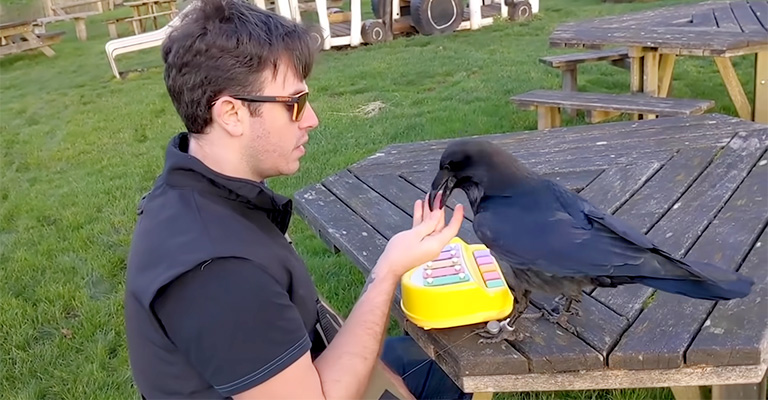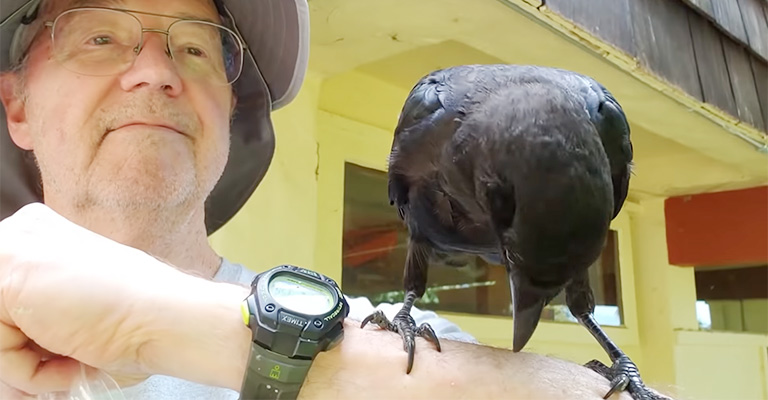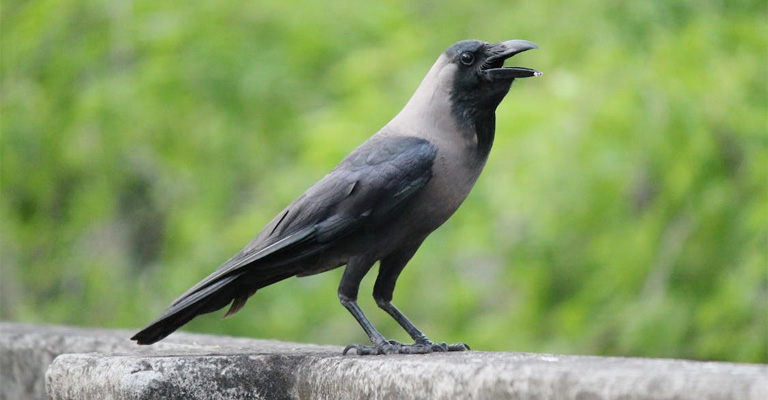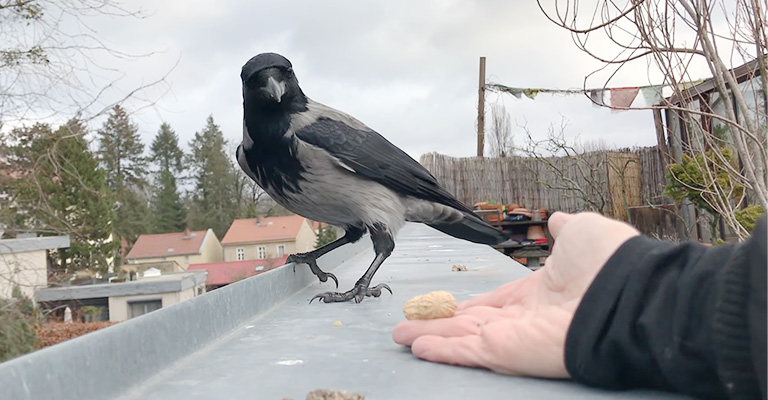Can crows be tamed? This question sparks curiosity and invites us to delve into the intriguing world of these intelligent and charismatic birds.
Crows have long fascinated us with their exceptional problem-solving abilities, social interactions, and adaptability. The concept of taming them opens up a realm of possibilities and challenges.
In this article, we explore the question of whether crows can be tamed, examining the complexities and potential of developing a bond with these remarkable creatures.

Can Crows Be Tamed?
Here we will delve into the question of whether crows can be tamed, examining the possibilities, challenges, and ethical considerations that arise when attempting to develop a connection with these wild avian beings.
The Nature of Wildness
Crows are inherently wild birds with natural instincts and behaviors that enable their survival in the wild. Taming a crow involves navigating its innate tendencies and finding a balance between its wild nature and its potential for forming connections with humans.
While crows may demonstrate adaptability and social intelligence, it is essential to respect their inherent wildness during the taming process.
Individual Personality and Disposition
Each crow has its own unique personality and disposition, which can impact the ease or difficulty of taming. Some crows may display more curiosity and openness to human interaction, while others may be more cautious or reserved.
Understanding and respecting the individuality of each crow is crucial when attempting to establish a connection and develop trust.
Patience and Consistency
Taming crows requires patience and consistency. Building trust with these intelligent birds takes time and effort. Consistently providing food, maintaining a calm and non-threatening presence, and respecting their boundaries are essential steps in the taming process.
Patience and consistency allow crows to gradually become more comfortable and trusting in their interactions with humans.
Ethical Considerations
It is important to consider the ethical implications of taming crows. While forming a bond with a crow can be rewarding, it is crucial to ensure that their well-being and natural behaviors are not compromised.
Crows are social creatures that thrive in the company of their own kind, and attempts to tame them should not result in isolation or hinder their ability to engage in natural behaviors.
Legal Regulations
Before attempting to tame a crow, it is essential to be aware of the legal regulations governing bird ownership in your region. In many places, it is illegal to keep native wild crows as pets without the necessary permits or licenses.
It is important to respect and adhere to these regulations to ensure the well-being of the crows and comply with local wildlife protection laws.
Do Crows Get Attached to Human Beings?

Whether crows get attached to human beings has captivated the curiosity of many. Crows, known for their intelligence and social nature, have forged intricate relationships with other crows and even different animal species.
As humans encounter crows in various settings, anecdotal evidence and scientific studies have shed light on the potential for these intelligent birds to form attachments with individuals. Let’s know do crows get attached to human beings-
Fascinating Social Behavior
Crows are highly social creatures and exhibit complex social behaviour within their communities. They form strong bonds with their family members and engage in cooperative activities such as mobbing predators and sharing information about food sources.
This social nature suggests that crows can form attachments, not only within their species but potentially with humans as well.
Recognition and Memory
Crows possess special recognition and memory abilities. They can recognize individual humans and remember specific faces over extended periods.
This capacity for facial recognition suggests that crows can distinguish between different people and form associations based on their interactions and experiences.
Positive Experiences and Rewards
Crows are known to be opportunistic and intelligent birds. They may develop a preference or attachment towards those individuals if they associate positive experiences or rewards with specific humans, such as receiving food or experiencing non-threatening interactions.
This phenomenon has been observed in studies where crows showed increased familiarity and trust toward humans who consistently provided them with food or engaged in positive interactions.
Vocalizations and Communication
Crows communicate with diverse vocalizations, each with its own meaning and purpose. They make distinct calls when interacting with humans in different contexts. These vocalizations may indicate a level of recognition, comfort, or even a form of communication between crows and specific individuals.
This suggests that crows may establish a unique bond with humans based on shared experiences and effective communication.
Complex Emotions and Behaviors
Studies have shown that crows exhibit difficult emotions and behaviours like those observed in brilliant animals. They display empathy, problem-solving skills, and the ability to form lasting memories of past events.
These traits imply that crows possess a cognitive and emotional capacity that may contribute to developing attachments to individual humans.
Challenges Of Taming a Crow

Taming a crow can be a challenging endeavour due to various factors that come into play when attempting to establish a bond with these intelligent and independent birds.
While crows have demonstrated the ability to form connections with humans, it is essential to understand and navigate the challenges that arise during the taming process.
Wild Instincts
Crows are wild birds by nature, and their instinctual behaviours can pose challenges when taming them. Their innate instincts drive them to remain cautious of potential threats.
Taming a crow requires patience and consistency in building trust and overcoming the instinct to stay careful and maintain a safe distance.
Socialization with Their Species
Crows are highly social creatures that have complex social structures within their species. They thrive in the company of other crows and rely on social interactions for their well-being.
When attempting to tame a crow, the absence of a crow community may lead to feelings of isolation and stress for the bird.
Creating an environment that allows for socialization with other crows or providing appropriate substitutes for social interactions can help mitigate this challenge.
Strong Bonding to Their Territory
Crows have a solid attachment to their territory, which they fiercely defend against intruders, including humans.
When attempting to tame a crow, it is crucial to respect their sense of environment and establish a safe and comfortable space where they feel secure. Disrupting their territorial instincts can cause stress and hinder the taming process.
Independence and Self-Sufficiency
Crows are highly independent and self-sufficient birds. They are known for their problem-solving abilities and adaptability in finding food and resources. Taming a crow may be challenging as they resist attempts to depend on humans for sustenance or companionship.
It is essential to provide an environment that encourages their natural behaviours while gradually building a bond based on trust and positive reinforcement.
Potential for Aggression
While crows can form attachments with humans, they are also known for their territorial and protective instincts. Sometimes, attempts to tame a crow may lead to aggressive behaviours, especially during breeding season or when they perceive a threat.
Understanding crow’s behaviour and body language is crucial to avoid situations that may trigger aggression and to establish a relationship based on trust and respect.
How To Get Crows To Trust Me?

Building trust with crows requires patience, consistency, and a respectful approach. While each crow has its unique personality and disposition, the following strategies can help foster trust between you and these intelligent birds:
Offer Regular Food
Providing a consistent food source is an effective way to gain the trust of crows. Start by leaving small food offerings, such as peanuts or dry cat food, in an open area where crows can easily access them.
Gradually increase the amount and variety of food as the crows become more comfortable. Regularly replenish the food to establish a dependable presence and demonstrate reliability.
Maintain a Routine
Crows are creatures of habit and appreciate routines. Establish a consistent schedule for feeding the crows, preferably at the same time each day.
Crows are known to recognize and remember individuals, so by maintaining a predictable routine; they will become accustomed to your presence and associate it with positive experiences.
Be Patient and Calm
Crows are wise creatures who sense fear or unease. Approach them calmly and avoid sudden movements or loud noises that may startle them. Be patient and allow the crows to approach you at their own pace.
Avoid making direct eye contact, as this can be interpreted as a threat. Instead, maintain a relaxed posture and observe the crows from the corner of your eye.
Respect Their Space and Boundaries
Crows value their personal and territorial boundaries. Respect their boundaries by maintaining a reasonable distance and avoiding intruding on their nesting areas. Initially, it’s best to interact with crows in open spaces rather than near their nests.
Respecting their space demonstrates that you are not a threat and can build trust over time.
Communicate Positively
Crows are highly perceptive and can interpret human behaviour and vocalizations. Use gentle, friendly tones when communicating with them.
You can make soft clicking sounds or use specific vocal cues to associate your presence with positive experiences. Over time, the crows may recognize your vocal patterns and respond accordingly.
Stay Consistent:
Consistency is critical to building trust with crows. Maintain your presence and continue to offer food regularly. Consistent positive experiences will reinforce their perception of you as a reliable and non-threatening presence.
Even if the crows are initially cautious, consistent positive interactions will gradually strengthen their trust in you.
Building trust with crows is a gradual process that requires patience and respect. It is essential to appreciate that not all crows will readily approach or trust humans.
However, consistently employing these strategies increases the likelihood of developing a trusting relationship with these remarkable birds.
Can I Keep A Crow As A Pet?
Keeping a crow as a pet is a complex decision that requires careful consideration due to various factors and legal regulations surrounding bird ownership.
Understanding the challenges and responsibilities associated with keeping a crow as a pet is essential before making such a commitment.
Legal Considerations:
Laws and regulations regarding the ownership of crows as pets can vary by region and country. In many places, it is illegal to keep native wild crows as pets without proper permits or licenses. Before considering keeping a crow, research and familiarize yourself with the local bird ownership laws and regulations.
Ethical Concerns
Crows are highly intelligent and social creatures. They have complex social structures and are meant to live in the wild, where they can engage in natural behaviours and interact with their kind.
Keeping a crow as a pet may restrict their ability to express their natural instincts, engage in social interactions, and live fulfilling lives.
Specialized Care and Attention
Crows require specialized care and attention. They have unique dietary and environmental needs that may be challenging to meet in a domestic setting. Providing an appropriate diet, mental stimulation, and adequate space for exercise and flight can be demanding and time-consuming.
Longevity and Commitment
Crows have a relatively long lifespan, with some living up to 20 years or more in captivity. Keeping a crow as a pet requires a long-term commitment to its care and well-being.
It is essential to consider the implications of caring for a crow over an extended period and be prepared for the responsibilities that come with their long lifespan.
Wildlife Rehabilitation
In cases where a crow is injured or orphaned, it is best to contact a licensed wildlife rehabilitation centre. These professionals have the expertise and facilities to provide appropriate care, rehabilitation, and release back into the wild.
Supporting wildlife rehabilitation ensures that injured or orphaned crows receive the best possible care and can return to their natural habitat.
While crows are fascinating and intelligent birds, it is generally best to appreciate them in their natural habitat rather than attempting to keep them as pets.
Instead, focus on creating bird-friendly environments in your backyard, providing food, water, and shelter that can attract and support local crow populations.
FAQs
Yes, crows have demonstrated the ability to form attachments with individual humans. They can recognize and remember specific human faces, associating them with positive or negative experiences. However, the extent and nature of these attachments can vary between individual crows.
Building trust with crows requires patience and consistency. Start by offering regular food in a calm and non-threatening manner. Maintain a routine and establish a dependable presence. Respect their space and boundaries, communicate positively, and interact consistently.
In most places, keeping native wild crows as pets is illegal without the necessary permits or licenses. Crows are intelligent and social creatures best suited to living in the wild. It is generally more ethical and appropriate to appreciate crows in their natural habitat rather than keeping them as pets.
Yes, crows can recognize and remember individual humans. Their remarkable facial recognition skills allow them to distinguish between people and associate specific individuals with positive or negative experiences. This recognition and memory contribute to the formation of potential attachments with humans.
Crows may form attachments with humans for various reasons. They are social creatures and can benefit from positive interactions and consistent food sources. Developing extensions with humans may offer them advantages, such as access to reliable food or protection from predators.
Conclusion
The question of whether crows can be tamed reveals a fascinating and nuanced aspect of their nature. While crows are wild birds by nature, their remarkable intelligence and social adaptability make them potentially capable of forming connections with humans.
However, it is essential to approach the idea of taming crows with respect and understanding, taking into consideration their natural instincts, individual personalities, and legal regulations surrounding bird ownership.
Ultimately, the process of taming crows requires patience, consistency, and a deep appreciation for their wild essence. As we continue to explore the possibilities of human-crow interactions, we gain a deeper understanding of these extraordinary birds and the intricate relationship between our species.